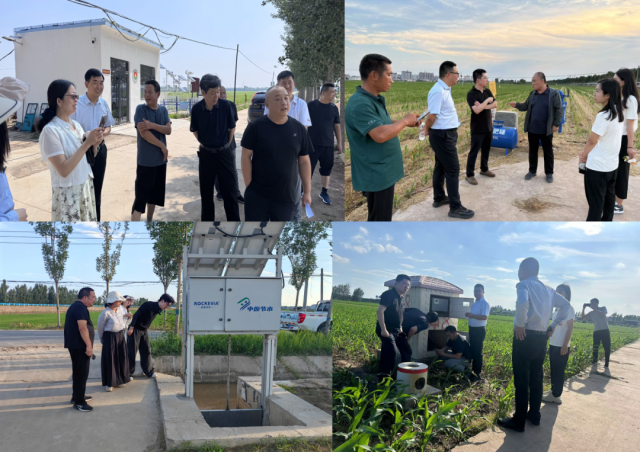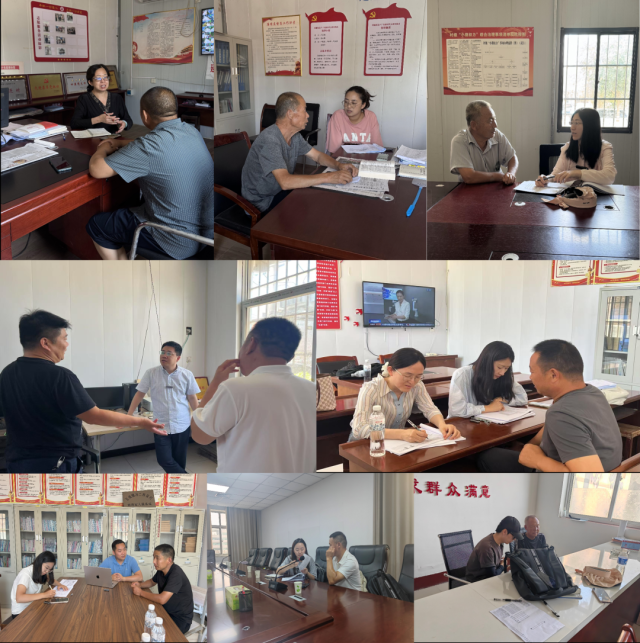current location: Home> Central News
Central News
Professor Jinxia Wang Leads Team to Henan and Hebei for Specialized Research on Water Resources Management
Release date:2025/07/09 Source: CCAP
From July 2 to 4, 2025, Professor Jinxia Wang, Director of the China Center for Agricultural Policy, Peking University, led a team to conduct the second round of the preliminary investigation for the sixth large-scale tracking survey of the “China Water Institution and Management (CWIM)” project in the provinces of Henan and Hebei. The first round of the preliminary investigation was completed in Ningxia at the end of June. As a long-term tracking study, the CWIM project has previously carried out five rounds of surveys in 2001, 2004, 2007, 2011, and 2016.
The research team included Dr. Zhuanlin Wang (Postdoctoral Fellow, School of Advanced Agricultural Sciences, Peking University), doctoral students Ruoying Mei, Zhiyi Guo, and Yingying Sun, research assistants Bingxu Guo and Liwen Yang, Associate Professor Yi Cui(School of Economics, Beijing Technology and Business University), Associate Professor Tianhe Sun (Institute of Economic Research, Hebei University of Economics and Business), Assistant Professor Huang Chen (School of Economics, Xiamen University), and Deputy Editor Lijuan Zhang (Institute of Rural Development, Chinese Academy of Social Sciences).

Figure 1. Team Members Visit High-Standard Farmland and Digital Water Conservancy Projects
On the morning of July 2, the research team held discussions with officials from relevant departments of the Henan Provincial Department of Water Resources and the Department of Agriculture and Rural Affairs. The team gained in-depth insights into Henan’s recent key reform initiatives and directions in water resources management—such as metering facilities, water pricing reform, and agricultural irrigation—as well as in comprehensive agricultural development, including integrated water and fertilizer technologies, agricultural extension services, and the construction of high-standard farmland.

Figure 2. Team Members Hold Discussions with Leaders from the Department of Water Resources, Department of Agriculture and Rural Affairs, Water Affairs Bureau, and Agriculture Bureau
From July 2 to 4, the research team conducted fieldwork in Yuanyang County, Yanjin County, and Weihui City in Henan Province, as well as Cixian County and Yuanshi County in Hebei Province. They engaged in in-depth discussions with officials from local Water Affairs Bureaus, Agriculture and Rural Affairs Bureaus, township-level irrigation management service companies, and relevant specialized cooperatives. These discussions focused on the progress, key achievements, and challenges related to irrigation management reform, water rights and comprehensive agricultural water pricing reform, smart water conservancy development, and the promotion of high-efficiency water-saving agriculture.
The team also visited high-standard farmland demonstration zones, modern sluice stations, intelligent water-saving systems, and digital water conservancy facilities such as integrated water and fertilizer technology platforms, gaining first-hand insight into the practical application and impact of advanced technologies. To obtain a more comprehensive understanding, the team conducted rural visits and held face-to-face conversations with village leaders and farmers, while also testing the research questionnaire.
Through provincial-level discussions and three consecutive days of grassroots interviews, the research team developed a deeper and more systematic understanding of the key initiatives and remarkable achievements made by water resources and agricultural departments in Henan and Hebei. These include reforms in irrigation management institutions, agricultural water pricing and water rights, digital water infrastructure, high-efficiency irrigation systems, integrated water-fertilizer technologies, and high-standard farmland development.

Figure 3. Team Members Conduct Field Research in Villages
This research effort received strong support and assistance from the Henan Provincial Department of Water Resources and Department of Agriculture and Rural Affairs, as well as from relevant county-level water and agricultural departments and grassroots management units in both Henan and Hebei provinces. Their collaboration provided crucial support for the research team to gain an in-depth understanding of the current status of key areas such as agricultural water rights confirmation, grassroots water management, agricultural water pricing and water rights trading mechanisms, digital water conservancy development, and high-standard farmland construction across the two provinces.
The field data and key findings obtained through this preliminary study will serve as a critical foundation for refining the formal research design and survey instruments for the upcoming large-scale investigation. Ultimately, the insights gained will contribute to the improvement of irrigation management practices, the optimization of agricultural production models, and the formulation of policies aimed at promoting the sustainable use of water resources.



 Home
Home



